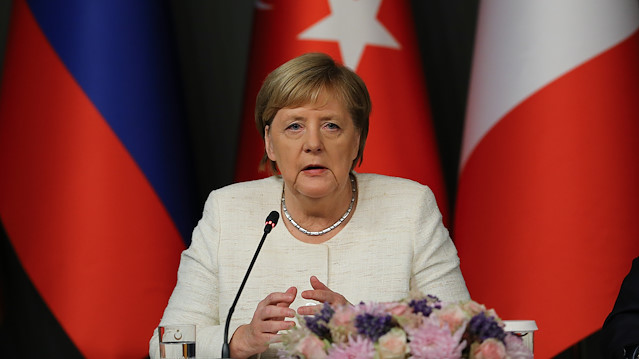
Chancellor Merkel pledges support for sustainable, permanent cease-fire in Syria’s Idlib province
The German chancellor pledged support for Turkey and Russia on Saturday for their joint efforts to achieve a permanent cease-fire in Syria’s Idlib province.
Speaking at a joint news conference after the four-nation summit on Syria, Angela Merkel underlined the importance of the Sept. 17 agreement between Ankara and Moscow to establish a demilitarized zone in Idlib.
“Today, we have committed ourselves to do everything to achieve a sustainable, permanent ceasefire in Idlib,” she said.
Ankara and Moscow agreed in September to establish a demilitarized zone in Syria's northwestern province of Idlib.
Under the deal, opposition groups in Idlib are to remain in areas where they are already present, while Russia and Turkey carry out joint patrols in the area with a view to preventing a resumption of fighting.
On Oct. 10, the Turkish Defense Ministry announced that the Syrian opposition and other anti-regime groups had completed the withdrawal of heavy weapons from the Idlib demilitarized zone.
Merkel underlined that despite their differences the leaders of Turkey, Russia, Germany and France had “a very productive meeting” in Istanbul, and managed to reach an agreement on a joint communique, covering most important issues of the Syrian conflict.
Merkel repeated her call for reviving the UN-led political process for Syria, stressing that there could be no military solution to the conflict.
“At the end of this political process, there should be free elections. All Syrians, including those in the diaspora, should be able to cast their ballots,” she said.
Merkel said the leaders would do their utmost in the coming days to see the constitutional committee for Syria starting its work by the end of this year.
On Russia’s proposals for the return of Syrian refugees, Merkel underlined that the realization of such proposals were also dependent on the political process.
When asked about her bilateral meetings with Turkish President Recep Tayyip Erdogan and French President Emmanuel Macron earlier on Saturday, Merkel said in both of these meetings they have also discussed the killing of Saudi journalist Jamal Khashoggi.
“As there has been no clarification until now, there will be no arms exports to Saudi Arabia,” she said, referring to her government’s decision to stop weapons exports to Saudi Arabia.
Merkel said they would wait for further information from the investigation, and accordingly discuss with other EU member states for a common stance and possible measures against Riyadh.
Khashoggi, a columnist for The Washington Post, was last seen on Oct. 2 when he entered the Saudi Consulate in Istanbul.
After weeks of denying involvement in his disappearance, Riyadh recently admitted that he had been killed inside the consulate by an operation involving intelligence officers.
But Saudi Foreign Minister Adel al-Jubeir insisted that Mohamed bin Salman -- Saudi Arabia’s crown prince -- had no prior knowledge of a plot to murder the journalist.




